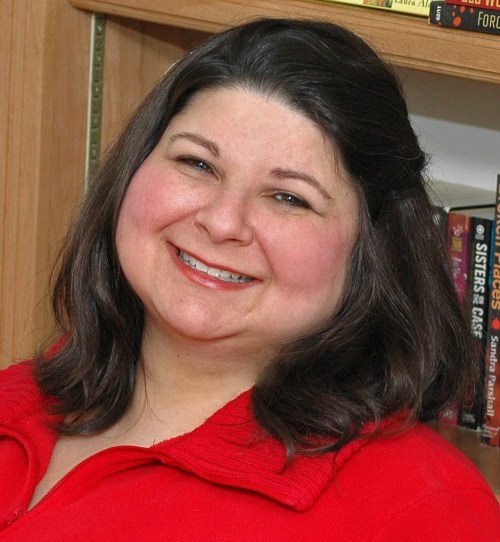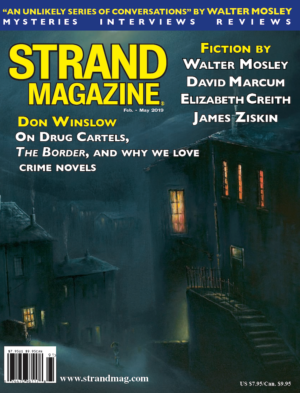
Barb Goffman is a highly successful short story writer. Her work has appeared in many magazines and anthologies and she has been nominated for just about every prize there is for writers of short mysteries–and won many of them!!
Her style is different from that of last month’s guest writer, John Floyd, but her commitment to her work is just as intense. If you don;t know her work, read it!
This successful and talented woman has kindly agreed to share with us. Here are her answers to the What Editors Want You to Know, questions.
Joan: When did you start writing? What drew you to the short story form and what keeps you writing short stories? Do you write short stories in other genres besides mystery?
Barb: I started writing mysteries in 2001, but that was a novel. I started writing crime short stories in 2004. I tried writing my first short story because my Sisters in Crime chapter had an open call for stories for an anthology, and since the number of people who could submit was limited (to chapter members), I thought I might have a better chance of acceptance than an anthology that could get hundreds of submissions. I also thought that having a published short story could help when I eventually tried to get my novel published. It turned out that I loved the short-story form and have concentrated on it since. I love the fast turn around–I can go from idea to story completion in a matter of days (assuming I have the time to write). I love that a story can be submitted without an agent, then accepted and published in a matter of weeks or months, rather than years that a novel could take. And I love that the short story allows me to write so many different tales in the time that one otherwise would take. For someone who used to be a newspaper reporter, especially, the short story is a good fit. As a reporter I wrote a new article every day. A short story fills my same inclination to start and finish quickly and always have something new to work on.
As to other genres, I stick to crime/mystery (and that is a broad category that includes cozy, traditional, thriller, suspense, noir, police procedural–I write them all), although sometimes I will write cross-genre, meaning I add in elements of another genre, such as magical realism or horror, to my crime story. I love magical realism. It can be a lot of fun.
Joan: Do you write other forms as well? (blogging, articles, essays, novels, poems?) Do you focus on crime/mystery in these other forms?
Barb: I blog every third Tuesday at
www.SleuthSayers.org. My posts there usually address writing, especially writing related to crime short stories. I’ve had posts addressing opening lines, reasons short stories get rejected, and the inspiration behind my stories, among other topics. As I mentioned above, I also have written a novel. It is one edit away from being ready to be sent out, but it sits in a drawer. I’m much more interested in writing short stories.
Joan: You have been widely published and widely awarded in the mystery field–what advice do you have for writers entering contests?
Barb: I don’t enter contests. Contests often charge entry fees, and I believe that money should flow to the writer, not away from the writer. With a contest, while the winner and maybe a runner-up or two might get some money, everyone else is merely paying for the chance to be considered. A lot of these contest organizers will publish an anthology with the winners and some of the also-rans, but the also-rans get no payment; the publisher gets to keep it all the income, and the writer gets exposure. That’s not such a great deal. As the saying goes, you can die from exposure. If you’ve taken the time to write a story that you hope someone else will publish in an attempt to make money, that publisher should be willing to share with you the income he/she makes using your story.
That said, early in my career I did enter two contests. In one case the entry fee was low and I was willing to pay for the chance to get into that anthology. (I didn’t. Goodbye ten dollars.) In the other there was no fee to enter. The authors of the top three stories won things (a Kindle, I think, and other items). The remainder of the top ten got their stories published, but there was no payment. I was willing to take that chance because I’d written a middle-grade story and had been having a hard time finding submission venues. So I was willing to ultimately accept publication without payment. I’ve also accepted publication without payment when the proceeds are going to charity.
Considering all this, my advice is to start submitting your story to the best venues you can. You never know when it will be accepted. If you ultimately decide that you’re willing to pay to submit to a contest, or that exposure is good enough payment for a particular story (and I recognize that the newer you are, the more exposure has appeal), be sure to read the submission rules carefully and follow them. Don’t disqualify yourself from the get-go.
Joan: Advice for writers submitting to large national magazines Ellery Queen and others? For those submitting to anthologies?
Barb: I have the same advice for all submissions: Write the best story you can, let it sit after you’re done (a day, a week, a month–you’ll have to learn what works for you) so that when you come back to read it, it will be with fresh eyes. Then edit. Rinse, repeat. Find someone trusted to read your stories and tell you what works and what doesn’t. Edit again until you really think it’s good. Don’t get so excited about your wonderful story that you send it out too soon, only to kick yourself later when you read it with fresh eyes and think, Oh, I should have done, X, Y, and Z. (I’ve been there. It’s annoying as hell.)
Then when you are ready to submit, make sure you follow the instructions. As I said above, don’t disqualify yourself from the get-go because your story is 100 words too long or you didn’t set your margins properly. And don’t think pesky submission rules can be disregarded. Sure, it might just take you thirty seconds to fix your margins, so surely the editor could do it after she accepts your story. But imagine the editor having to do that for every story. And not just fix the margins but fix the indents and the font and the font size and … and you should get the idea why editors give rules for manuscript formatting at the outset. Even if your story is the best story ever written and you know the editor will take it even if you don’t follow the rules, you still should follow the rules because you want the editor to think you’re someone easy to work with, not a prima donna.
Joan. Can you name some of your favorite magazines to read and to submit to?
Barb: Here are some for mystery fiction: Ellery Queen’s Mystery Magazine, Alfred Hitchcock’s Mystery Magazine, Black Cat Mystery Magazine, Flash Bang Mysteries (which is an e-zine).
Joan: What writing organizations do you belong to and why for each one? (Benefits you receive and skills you contribute to each, please)?
Barb: I belong to Sisters in Crime (and its Chesapeake, Central Virginia, and Guppies chapters), Mystery Writers of America (and its Mid-Atlantic chapter), and the Short Mystery Fiction Society.
Sisters in Crime was the first organization I joined after I started writing mystery fiction. I love how it gave–and gives–me the chance to meet and become friends with other crime-fiction authors and to learn from writers and subject-matter experts at monthly meetings. Plus there are field trips, the ability to meet critique partners, the chance to submit to anthologies, and so much more. My first mystery publication was in a SinC Chessie anthology! I’m a lifetime member of Sisters in Crime, and it is money well spent. What do I contribute to SinC? I’ve been president, secretary, and newsletter editor of the Chessie Chapter. I currently am the Chessie Chapter election chair and I help out the board as needed, including working with a great subgroup putting together a workshop for this June 2nd on reinventing your mystery career. I also co-edit the Chesapeake Crimes anthologies with Donna Andrews and Marcia Talley.
What I love about SinC is also what I love about MWA: attending monthly meetings, seeing and learning from other authors and subject-matter experts. As with SinC, I’ve also been actively involved with my local MWA chapter. I served as secretary for a few years. Now I am the chapter’s election chair. (Between MWA and SinC I run all the mystery elections in the Mid-Atlantic area. Ooh, the power. Just kidding. Maybe.)
The Short Mystery Fiction Society is an online group from which I learn a lot about writing and writing calls, and I try to weigh in when I can. This group also gives out the Derringer Awards and has made great strides in promoting short mystery fiction. It’s a wonderful organization.
Joan.:What writing conferences have you found most helpful to you and why?
Barb: I haven’t been to a lot of writing conferences–a conference being a multi-day craft event aimed at helping authors with their writing and with getting published. One that stands out is Sleuthfest, which is held in Florida. Not only did it have good classes, but I had an experience there that I later used as a jumping off point for what became my first published short story, “Murder at Sleuthfest.” (No, I didn’t kill anyone at the conference, though I was tempted. You’ll have to read the story to find out why.)
The sadly defunct Tony Hillerman Writers Conference was another one I really enjoyed. I learned about writing and gained confidence and met some great authors, including Sandi Ault–a wonderful writer and teacher–and Craig Johnson. Plus I got to go to New Mexico!
As a teacher, I’ve participated in Deadly Ink, which is a combination conference/convention. The first day is devoted to teaching craft. The next two days are devoted to fan-oriented panels. A few years ago I taught a short-story class with Donna Andrews at Deadly Ink, and it was really rewarding. Deadly Ink is held each summer/fall (the date changes sometimes) in New Jersey, and especially if you live in the Mid-Atlantic/New York City area, it is worth checking out.
I also attend two fan conventions every year: Malice Domestic and Bouchercon. These conventions don’t have panels devoted to teaching you how to write, but you still can learn about the industry by hearing authors talk (on and off panels), and authors will sometimes give writing tips on panels too. These conventions also give me the chance to meet readers, which is so important. I love to write, but I love being read, so it’s great to be able to meet people who are interested in what I write and to meet people who have read what I’ve written and want me to write more. That’s a high that’s hard to describe. Finally, both Bouchercon and Malice have anthologies associated with them. I’ve had a story published in one Malice anthology and one Bouchercon anthology. I especially love that these books will likely be read by people who read exactly the kind of stories I like to write, so I’m grateful for the chance to submit to them when I have the time.
Joan: If something of yours is rejected to you save it and re-purpose it for another market? Examples?
Barb: Sure. You need a thick skin in this industry. Not every story will be accepted on first submission. Sometimes it means that the story needs work. Sometimes it simply means that the story wasn’t a good fit for the anthology or magazine in question. (Sometimes both.) But you shouldn’t give up.
Here’s a perfect example: I wrote my short story “Bug Appétit” for an anthology of Thanksgiving food/crime stories, but the editor passed because he felt that the story wouldn’t be a good fit for an anthology that people likely would be reading on Thanksgiving, perhaps between meals or while eating appetizers. (The story title might give you a hint as to why he worried about readers’ reactions.) But I turned around and submitted that story to Ellery Queen’s Mystery Magazine. They took it, and editor Janet Hutchings called it “one of the best holiday stories I have ever read.” That story was nominated for an Agatha Award and is currently nominated for the Anthony Award.
Joan: Have you ever served as a writing contest judge or an editor? What advice can you offer from that perspective?
Barb: Yes, I’ve done both. My advice, as I’ve said earlier, is to follow the submission instructions. If you don’t do that for a contest, your story might be disqualified without being read. Such disqualification could happen with an anthology or magazine too. But even if it doesn’t, seeing an author didn’t bother to follow the guidelines would make me worry that this person might not be easy to work with. And life is too short to work with difficult people. Moreover, the more an author doesn’t follow the guidelines, the more work I have to do to get the story into shape, and the more I might be inclined to instead accept a different story, one that wouldn’t take as much effort on my part to get the story ready for publication.
Rules aside, remember also that contest judges and editors also are readers. They are looking for good stories. They want to be entertained. Don’t lose sight of that.
Joan: What is the best piece of advice you ever received as a writer and what word or words of advice would you like to pass on to other writers? Anything else you wold like to add that I did not ask about?
Barb: Good advice I’ve received, practiced, and given: read, read, read. The more you read in the genre you’re going to write in, the more you will become immersed in the genre’s standards. You also will begin to see what works and what doesn’t, plot-wise and writing-wise.
One more bit of advice: Enjoy the journey. Sure, we all write to be read. But it might be a while from when you start writing to when you get published. And some stories might never get published at all. If you’re only in it for the publication credit at the end, you could get discouraged. Writing could become a slog or a chore. But if you enjoy the process of writing, the process of creation, you’ll be so much happier. So don’t let yourself get so wrapped up in the end result that you can’t enjoy the actual writing. After all, you got into this field because you like writing, right? Don’t lose sight of that.
Joan: Thank you, Barb, for all of this excellent advice!








